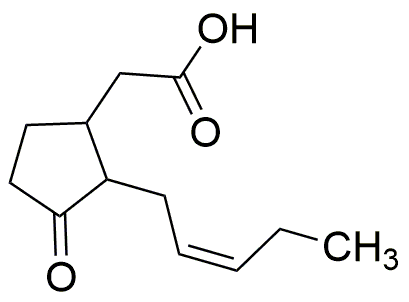Jasmonic acid (mixture of isomers) is widely utilized in research focused on:
- Plant Growth Regulation: This compound plays a crucial role in regulating plant growth and development. It is often used in agriculture to enhance crop yield and resilience against environmental stressors.
- Stress Response in Plants: Jasmonic acid is essential for activating defense mechanisms in plants against pests and diseases. Researchers apply it to study plant responses to biotic and abiotic stress, helping to develop more resilient plant varieties.
- Pharmaceutical Research: In medicine, jasmonic acid is explored for its potential anti-inflammatory and anti-cancer properties. Its applications in drug development are significant, as it may lead to new therapeutic agents.
- Flavor and Aroma Enhancement: The compound is used in the food industry to enhance the flavor and aroma of various products. It can improve the sensory qualities of fruits and vegetables, making them more appealing to consumers.
- Biotechnology Applications: Researchers utilize jasmonic acid in genetic engineering to induce specific traits in plants. This application is vital for developing genetically modified organisms (GMOs) that can thrive in challenging environments.
General Information
Properties
Safety and Regulations
Applications
Jasmonic acid (mixture of isomers) is widely utilized in research focused on:
- Plant Growth Regulation: This compound plays a crucial role in regulating plant growth and development. It is often used in agriculture to enhance crop yield and resilience against environmental stressors.
- Stress Response in Plants: Jasmonic acid is essential for activating defense mechanisms in plants against pests and diseases. Researchers apply it to study plant responses to biotic and abiotic stress, helping to develop more resilient plant varieties.
- Pharmaceutical Research: In medicine, jasmonic acid is explored for its potential anti-inflammatory and anti-cancer properties. Its applications in drug development are significant, as it may lead to new therapeutic agents.
- Flavor and Aroma Enhancement: The compound is used in the food industry to enhance the flavor and aroma of various products. It can improve the sensory qualities of fruits and vegetables, making them more appealing to consumers.
- Biotechnology Applications: Researchers utilize jasmonic acid in genetic engineering to induce specific traits in plants. This application is vital for developing genetically modified organisms (GMOs) that can thrive in challenging environments.
Documents
Safety Data Sheets (SDS)
The SDS provides comprehensive safety information on handling, storage, and disposal of the product.
Product Specification (PS)
The PS provides a comprehensive breakdown of the product’s properties, including chemical composition, physical state, purity, and storage requirements. It also details acceptable quality ranges and the product's intended applications.
Certificates of Analysis (COA)
Search for Certificates of Analysis (COA) by entering the products Lot Number. Lot and Batch Numbers can be found on a product’s label following the words ‘Lot’ or ‘Batch’.
*Catalog Number
*Lot Number
Certificates Of Origin (COO)
This COO confirms the country where the product was manufactured, and also details the materials and components used in it and whether it is derived from natural, synthetic, or other specific sources. This certificate may be required for customs, trade, and regulatory compliance.
*Catalog Number
*Lot Number
Safety Data Sheets (SDS)
The SDS provides comprehensive safety information on handling, storage, and disposal of the product.
DownloadProduct Specification (PS)
The PS provides a comprehensive breakdown of the product’s properties, including chemical composition, physical state, purity, and storage requirements. It also details acceptable quality ranges and the product's intended applications.
DownloadCertificates of Analysis (COA)
Search for Certificates of Analysis (COA) by entering the products Lot Number. Lot and Batch Numbers can be found on a product’s label following the words ‘Lot’ or ‘Batch’.
*Catalog Number
*Lot Number
Certificates Of Origin (COO)
This COO confirms the country where the product was manufactured, and also details the materials and components used in it and whether it is derived from natural, synthetic, or other specific sources. This certificate may be required for customs, trade, and regulatory compliance.


